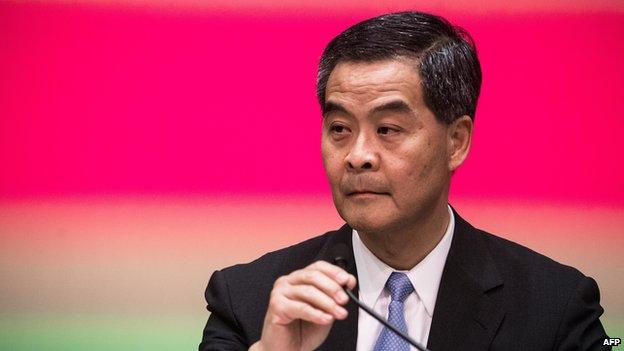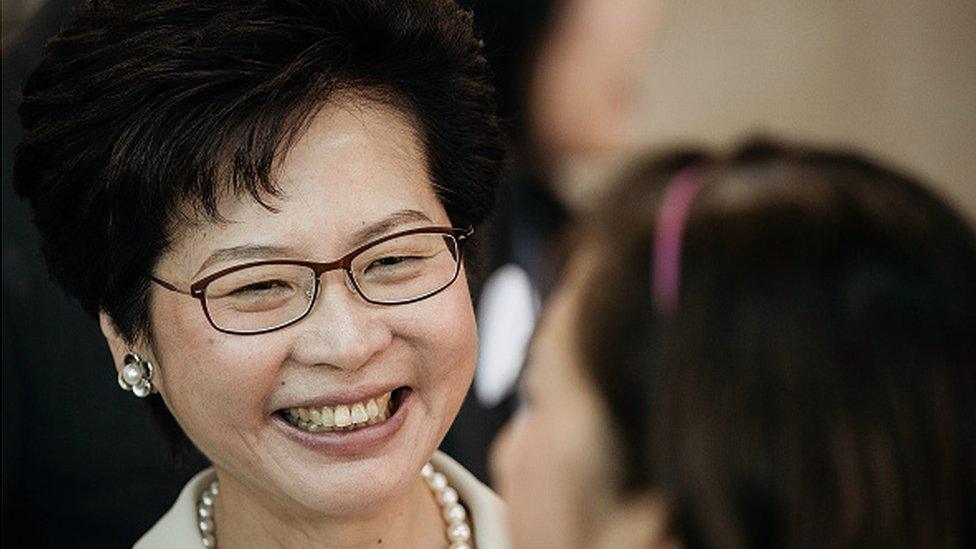Hong Kong profile - Leaders
- Published
Chief executive: CY Leung

Mr Leung has pledged to fight poverty and high housing costs
Pro-Beijing politician Leung Chun-ying's tenure has been marked by recurring political battles with Hong Kong's pro-democracy opposition.
The chief executive, usually known as CY Leung, succeeded Donald Tsang - who had served the maximum two terms allowed - in 2012 to become Hong Kong's third chief executive through an unusually bitter electoral contest with another pro-China candidate, Mr Tsang's former deputy Henry Tang.
Mr Tang won an unprecedented 24% of the votes in the electoral college, despite reports of strong Chinese pressure on his supporters to back Mr Leung.
As a result, Mr Leung had a comparatively weak mandate, and took office amid major public protests over the lack of democracy and growing inequality.
Mr Leung's government said it made strides in fulfilling his pledges to combat poverty and rein in Hong Kong's high housing costs.
Tensions
A plan to introduce pro-China "patriotic lessons" in schools led protests and then an embarrassing climb-down on the eve of legislative elections in September 2012, at which pro-democracy parties retained enough seats to veto constitutional change.
The stand-off with pro-democracy forces reached new heights in 2014, when Mr Leung indicated his support for China's view that only candidates chosen by a nominating committee should stand in the direct universal elections for the post of chief executive in 2017.
Activists responded with an unofficial pro-democracy referendum in which almost 800,000 residents took part, and pro-democracy protesters occupied large parts of central Hong Kong. In June 2015 the Legislative Council rejected the election proposal.
After a lucrative career in property development, involving acting as advisor to several provinces in China, Mr Leung entered politics in the pro-China camp, rising to membership of Hong Kong's ruling Executive Council and China's People's Political Consultative Conference parliamentary body.
Chief Executive-elect; Carrie Lam

Carrie Lam faces demands for greater democracy
Ms Lam was deputy to Chief Executive Leung Chun-ying in 2012-2017, building up a reputation for administrative competence and pragmatism when compared with her gaffe-prone boss.
Nonetheless, she remains unpopular with democracy campaigners, especially after publicly defending China's 2014 proposal to have the chief executive elected from a list of Beijing-approved candidates.
The ensuing mass protests led to the territory's Legislative Council rejecting the proposal.
Ms Lam worked in the civil service under the British administration and stayed on after the transfer to China, taking senior positions in the social welfare, housing and home affairs departments before joing Mr Leung's government as chief secretary.
She saw off a challenge by the more popular Financial Secretary John Tsang to receive China's support in the chief executive election, winning with nearly 67% of the vote in the pro-Beijing Electoral College.
Ms Lam has pledged to bring younger people into government and cut housing costs, but remains non-committal on the question of greater democracy. She takes office on 1 July.